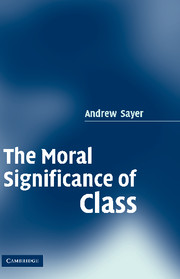Book contents
- Frontmatter
- Contents
- Preface and acknowledgements
- 1 Introduction
- 2 From the habitus to ethical dispositions
- 3 Recognition and distribution
- 4 Concepts of class: clearing the ground
- 5 Struggles of the social field
- 6 Moral and immoral sentiments and class
- 7 Responses to class I: egalitarianism, respect(ability), class pride and moral boundary drawing
- 8 Responses to class II: explanations, justifications and embarrassment
- 9 Conclusions and implications
- Bibliography
- Index
5 - Struggles of the social field
Published online by Cambridge University Press: 22 September 2009
- Frontmatter
- Contents
- Preface and acknowledgements
- 1 Introduction
- 2 From the habitus to ethical dispositions
- 3 Recognition and distribution
- 4 Concepts of class: clearing the ground
- 5 Struggles of the social field
- 6 Moral and immoral sentiments and class
- 7 Responses to class I: egalitarianism, respect(ability), class pride and moral boundary drawing
- 8 Responses to class II: explanations, justifications and embarrassment
- 9 Conclusions and implications
- Bibliography
- Index
Summary
Introduction
Class inequalities involve not merely differences in wealth, income and economic security, but differences in access to valued circumstances, practices and ways of life – ‘goods’ in a broad sense – and in the recognition or valuation of those goods and their holders. They produce and are shaped by struggles and competition, domination and resistance, as well as compliance, whether willing or reluctant. What is the nature of these struggles? What are they about? What are the goods that are being struggled for? What is the relation between the valuation of particular goods and the social position of the groups with which they are associated? The purpose of this chapter is to answer these questions. As we noted in chapter 1, lay moral sentiments and norms regarding how people should treat one another and how different behaviours should be evaluated imply assumptions about the nature of goods and the good life. We will deal with the latter first, moving on to moral sentiments and evaluations of behaviour in subsequent chapters.
I shall begin with the general nature of the struggles in question, what they are over, for and about, and what broad forms they take. To what extent are they instrumental struggles for power per se, or struggles over access to valued ways of life? To what extent do they involve contestation of the definition and evaluation of goods or competition for goods whose value is agreed upon but which are unequally distributed?
Information
- Type
- Chapter
- Information
- The Moral Significance of Class , pp. 95 - 138Publisher: Cambridge University PressPrint publication year: 2005
